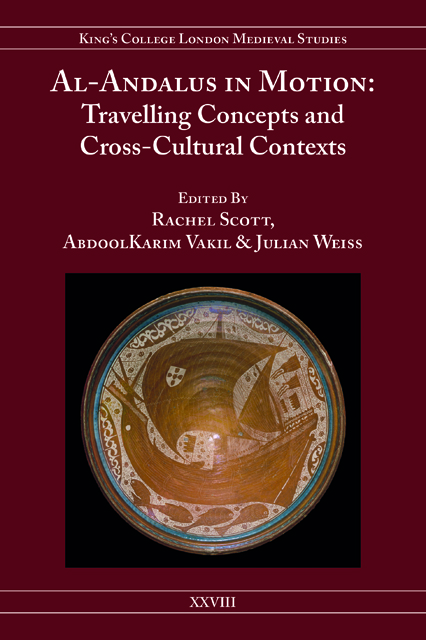Book contents
- Frontmatter
- Contents
- List of Illustrations
- Acknowledgements
- Notes on Contributors
- Part I Departure Points
- Part II Translating Al-Andalus: Travelling across Languages
- Part III (Re)Visions of Al-Andalus in Diaspora and Exile
- Part IV Andalusi Space as Node and Utopia: Europe, Islam, Empire
- Part V Al-Andalus and the Politics of Religious Identity
- Part VI Legacies, Landscapes and ‘Travel Buildings’
- Epilogue
- Index
9 - Medievalist Passports: Contested Rights of Return for the Descendants of Medieval Iberian Jews and Muslims
Published online by Cambridge University Press: 02 June 2023
- Frontmatter
- Contents
- List of Illustrations
- Acknowledgements
- Notes on Contributors
- Part I Departure Points
- Part II Translating Al-Andalus: Travelling across Languages
- Part III (Re)Visions of Al-Andalus in Diaspora and Exile
- Part IV Andalusi Space as Node and Utopia: Europe, Islam, Empire
- Part V Al-Andalus and the Politics of Religious Identity
- Part VI Legacies, Landscapes and ‘Travel Buildings’
- Epilogue
- Index
Summary
When writing their history, nations tend to silence the voice of marginalised groups, including that of ethnic and religious minorities, especially when these have been expelled and/or displaced in any shape or form (Wacks 2019). Recently, the weakening of the nation-state in a globalised context, coupled with the self-organisation of these communities, have allowed some of them (but not others) to lobby their way back into the national narrative.
Spain's modernity can hardly be tackled without making reference to the momentous expulsions of its Jews (1492–99), Muslims (1501) and Moriscos, i.e. Christians of Muslim ancestry (1609–14) (Flesler 2008; Martin-Marquez 2008). This essay analyses the right of return for the descendants of medieval Iberian Jews and Muslims in light of the so-called ‘Law of Return’ (2015–), which raised the possibility of passing a bill granting Spanish citizenship to the descendants of these communities. I argue that Spain's eventual decision to grant citizenship to the descendants of expelled Iberian Jews from 2015 to 2019, while denying an equivalent opportunity to the descendants of expelled Iberian Muslims (and to those occasionally perceived as such, the Moriscos) is best understood as part of a broader strategy of national branding (Anholt 2011), mainly expressed in public discourse. This campaign has antecedents in the nineteenth century and is anchored in the discursive articulation of Sepharad as a legitimising identity (Ojeda-Mata 2018; Aliberti 2018), and al-Andalus as a delegitimising identity (Garcia-Sanjuan 2018), respectively.
The Law of Return as a modern medievalist strategy of national branding
Post-2012 debates surrounding the Law of Return have been concerned with the possibility, convenience and/or legitimacy (or lack thereof) for the Spanish (and/or Portuguese) state(s) to pass a bill granting citizenship to the descendants of Jews and/or Muslims. Technically named ‘Ley Organica 12/2015, de 24 de junio, en materia de concesion de la nacionalidad espanola a los sefardies originarios de Espana’ (BOE 2015), it is important to note that the law does not apply to the descendants of converts (i.e. conversos of Jewish descent and moriscos of Muslim descent, regardless of whether or not they continued to practise their ancestral faith in secret), but only to the descendants of medieval Iberian Jews and Muslims.
- Type
- Chapter
- Information
- Al-Andalus in MotionTravelling Concepts and Cross-Cultural Contexts, pp. 227 - 252Publisher: Boydell & BrewerPrint publication year: 2021



